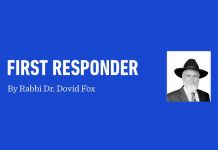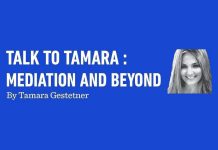By Daniel Feldman
During Rosh Hashanah and Yom Kippur, we spend many hours in the synagogue listening to the cantor pray, the rabbi give sermons, and the Torah reader read the beautiful holiday portion in a special High Holy Day tune. So much of the High Holy Days involves hearing. Were your ears and listening capacity at their optimal performance level this year?
Thank G‑d, new couples want to rush to be married and begin the New Year building a family. Attending such a simcha should be a joyous experience. Sadly, however, the joy can easily be diminished by loud wedding music. The noise can be more than just a painful, disturbing experience; it can be permanently damaging. Not only will it ruin your wedding experience, but it will ruin Shabbos, holiday, and daily functioning and communicating with others. Hearing loss creates difficulties not just for you, but for your family members and close friends.
My parents were deaf. As a young boy, I spent nearly the entire time in shul helping my father follow the davening and explaining to him what the cantor sounded like and what the shofar sounds were like. I enjoyed his satisfaction with my explanation and assistance. But I was always pained knowing that he could not experience these sounds firsthand. No description that I could give him was adequate to convey the experience of the actual sounds.
The deaf and hearing-impaired miss out on conversations and important information. In Jewish life, they miss the opportunity to fulfill many mitzvos that involve hearing, such as hearing the sound of the shofar and the Torah reading. Deaf people manage to deal with these challenges and fare well. However, no deaf people I have spoken to have told me they don’t encounter difficulties or that they would choose to be deaf.
By living in an urban environment, we inevitably expose ourselves to unavoidable loud noises from trains, subways, construction noise, and planes. We also expose our ears to loud music coming from blaring simcha music. Some loud noises are completely avoidable. It is shameful that few people pay attention to protecting themselves from this noise. Hosts and attendants are unaware of the damage they cause themselves and others. The musicians, too, either don’t realize the damage they cause or believe that loud music is “leibedig” and this is what everyone wants.
Hearing loss is more prevalent than you may realize! A study published by the National Institute on Deafness and Other Communication Disorders (NIDCD) indicates that about 2% of adults ages 45—54 have disabling hearing loss. This rate increases to 8.5% for adults ages 55—64. Nearly 25% of those in the age group of 65—74, and 50% of those who are 75 and older, have disabling hearing loss.
Furthermore, it is estimated that approximately 15% of Americans (26 million people) between the ages of 20 and 69 have high-frequency hearing loss due to exposure to noise at work or during leisure activities.
I recently met with a few audiologists. They all confirmed a steady rise in the number of young children–teenagers as well as preteens–all having some degree of hearing loss directly attributed to constant exposure to loud music.
In an article on his website, Rabbi Jeff Forsythe, a private counselor and motivational speaker, provides a thorough analysis of the medical, social, and halachic problems of loud music. I will summarize some of his critical points, but I urge you to read the entire article, available at www.shemayisrael.com/rabbiforsythe/dangers/dangers.htm.
Normal conversational hearing occurs at about 60 db (decibels) and does not cause hearing damage. Each 3Â db increase equates to approximately double the sound level. Typical music played through loud amplifiers is at 130 db or above. That’s one thousand times the sound of a normal conversation! Is it any wonder that at a Jewish function you cannot converse with your neighbor standing or seated about a foot away from you?
Hearing is transmitted via the movement of small hair follicles in your ear. These follicles are extremely sensitive to loud noise. Most hearing loss and deafness is caused by damage to these hair follicles. Once they are damaged, they cannot be repaired. Exposure to loud sound levels at 150 db or above can cause permanent, irreversible damage to your ears in an average of 15 minutes. At a typical Jewish event, you are exposed to this loud music nonstop for at least an hour. If you attend several events frequently, you are compounding the damage to your ears.
The Torah uses unusual language regarding the commandment to guard our health. In Devarim 4:15, it says, “You shall guard your souls very much.” There is no other mitzvah for which the Torah uses the phrase “very much.” This implies that not only are we not allowed to be lax and passive regarding anything that may damage our health, but we must vigilantly protect ourselves from even slight harm. Additionally, the Torah forbids giving others permission to cause us harm. You cannot tell a musician to play the music loudly and absolve him from the responsibilities of damage that it causes your own ears. It is even truer that you are forbidden to cause damage to your friends’ hearing.
Talmud Bava Kamma, in explaining the laws of repayment for damages, states that the payment for making someone deaf is far higher than payment for normal damage. Ordinarily, a person who loses a limb is evaluated at the damage of loss of just the limb. However, a person made deaf is evaluated at the rate of the entire person, because a person’s ability to work is damaged by deafness far worse than by any other type of damage. Rashi explains that deaf people are “out of touch with the world,” since by not hearing, they miss critical conversations and are not immediately aware of what is occurring so that they can respond appropriately when necessary. This is why the damage caused by loud music needs to be guarded against so seriously.
What can you do to counter this trend? Education is your most important ally. When you understand what causes hearing loss and what resources are available to mitigate or treat the problems, you can make better decisions. I have set up a blog, hearingresource.blogspot.com, for this purpose. You will find a link to Rabbi Forsythe’s article. This blog is new, so please be patient during its startup. I hope that you will comment and contribute, and share your experiences and advice on how we can combat this urgent problem.
Everyone needs to know that loud music at these affairs is not leibedig or true simcha music. It is seriously damaging and against halachah! This can no longer be ignored.
It should be understood that well-meaning people go out of their way to protect the health and safety of their friends. Thus, your friend is responsible for ascertaining that the musicians at their events maintain the music volume at a safe, enjoyable level. If your friend does not do this, you can and should refuse to attend the affair and explain to your friend that you are preserving your health. If your friend is offended by your reasoning, perhaps you need to reevaluate your friendship.
The community should also know which musicians maintain a safe volume (and which refuse to cooperate). I hope to publish a form on my blog where you can submit the names of those musicians. Meanwhile, I urge you to post these names along with your comments of any affairs that you have attended and what occurred. We would like to know positive stories about those musicians who understand the problem and attempt to accommodate requests to lower the volume.
I hope that you will educate yourselves and be vigilant about your own hearing and that of your family and friends so that we can truly enjoy all of our celebrations. v
Daniel Feldman is a CODA (child of deaf adults) as well as a parent of a deaf child. He invites you to contribute and comment on his blog, www.hearingresource.blogspot.com. He is also available to discuss this article and the problems of deafness and hearing loss in your yeshiva or school. You can call him at 516-859-1629.













